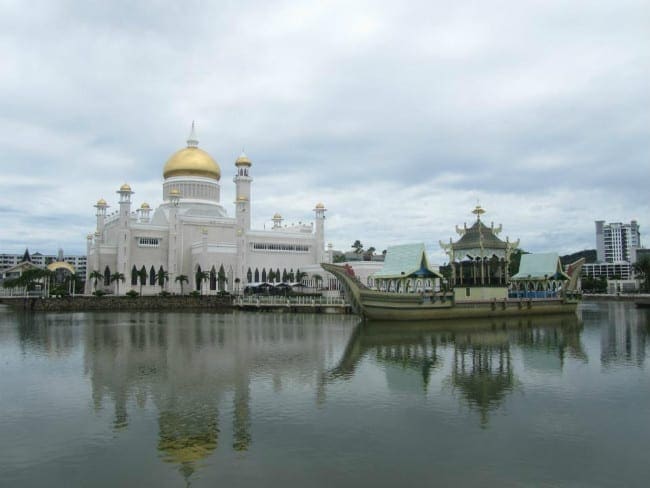No economic freedom… and a jail sentence in Brunei
July 10, 2023
Reporting from: Bandar Sari Begawan, Brunei
I could be locked up for writing this.
It’s important to realize that low taxation are just one element of economic freedom. The former alone does not guarantee the latter. An excellent illustration that principle is here in the tiny Sultanate of Brunei Darussalam.
Thanks to a pure geological fortune, this small sultanate is blessed with oil- and gas-rich waters that have allowed the country to become wealthy. Well, wealthy with an asterisk. Thanks to this vast resource wealth, Brunei does not impose personal income taxes, but does ding corporate income at 30%. Now, get ready for the asterisk…
It comes at a price however; the Sultan owns everything in the country. Every inch of land, all the oil, everything. Himself. Personally. If you want to build something, you need a concession from his majesty.
I brought Singapore dollars to use here – the Brunei dollar is pegged to it – but asked to exchange a few of them into local currency for kicks. Imagine how unsurprised I was to find that every banknote had the Sultan’s face plastered all over it, a reminder of his great magnificence.

On this Friday afternoon, I have the capital city of Bandar Sari Begawan (“BSB”) to myself. It’s prayer time from noon to 2 and every business must shut down by law. I respect the strong religious traditions embedded here, but theocracy is rarely a good thing for economic freedom. Lack of freedom in one area tends to creep into another.
And that’s just the beginning. Like any bad government (read: most of them), they know just the sweet spots to hit. Free medicines, free doctors, free university – it’s all here. Brunei is an American socialist’s wet dream.
The price for all of this is living under the edict of a guy who lives in a house with 290 bathrooms. He has also appointed himself to just about every government post in existence, down to National Police Inspector. You’d think a billionaire running a country would want to have a hobby outside of work. (Maybe he and Michael Bloomberg could be friends.)
The country is rather closed off to the world, and to foreign workers and investment, because they want to keep the social fabric intact. That social fabric includes government pushing one ethnic group to succeed and making working here a total chore for foreigners.
Yet desperate to escape the one-track path of oil wealth, they want to be an offshore financial center. Efforts to do so have fizzled. With one guy running the country like we’re back in the Middle Ages, I can imagine why. Rather high corporate tax rates outside the offshore sector don’t help either.
Add to that restrictions on banking and you’d think even a Sultan’s top yes man could get the message across.
Perhaps if government put some of their resources into liberalizing taxation, trade, banking, or cultural mandates, they could achieve the offshore financial status they desire. Then they could move past merely stashing oil money away into their sovereign wealth fund waiting for their luck to finally dry up. Don’t count on that with this ruling family of 600 years in charge.
Which means don’t count on it.
The failure of Brunei to become an offshore success is more apparent when you consider another offshore center so close by. Malaysia’s autonomous region of Labuan in maritime Malaysia has developed a reputation in this region as an up-and-coming tax haven for Asians, yet most people have never heard of it.
I’ll be in Malaysia tomorrow and will be reporting on opportunities there later. If Brunei wants to compete with this neighbor it will need to up its game.
Always be careful when seeking economic freedom – it’s not as simple as it seems and low taxes alone do not freedom make. If I lived in Brunei, I’d be internationalizing as many assets as I could.


Is Grenada Safe for Visitors, Residents and Families?
Evaluating a nation for tourism, relocation or investment begins with a single, non-negotiable factor – safety. Security, from both a personal and financial point of view, is the foundation upon which all other considerations rest. And while it’s easy to assume that stability is a given in the developed world, recent challenges in countries like […]
Read more

Is Antigua Safe for Tourists, Families and New Residents?
Security is a cornerstone of any serious investment migration strategy. For high-net-worth individuals (HWNIs) and globally mobile families, it ranks alongside tax efficiency, political stability, and quality of life as a key driver in deciding where to live, invest or acquire a second passport. Too often, safety is assumed to align with economic development. Countries […]
Read more

Is St Kitts and Nevis Safe? Tips for Tourists and Residents
Safety is a non-negotiable factor for anyone considering whether a country is right for travel, relocation or investment. Overlooking such a vital consideration carries serious consequences, and the stark truth is that assumptions based on a country’s global image often fall short of reality. Cases in point include the following countries: The takeaway is clear: […]
Read more




